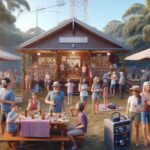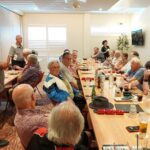Where can I learn more about amateur radio?
The ABC published this brilliant overview of amateur radio in 2018 – it is just as relevant today.
Here are some useful websites.
The Wireless Institute of Australia
The Radio Amateur Society of Australia
The American Radio Relay League
The Radio Society of Great Britain
Do I need to hold an Amateur Radio Licence to be a member of BDARS?
The answer is no. We welcome both licensed and non-licensed people to come along to the club, see who we are and get involved if you like what you see.
How do I join BDARS?
Membership of the Society is open to all with an interest in communication via radio. We welcome those living locally, interstate or overseas. Students are especially welcome. You are not required to hold a radio license for membership of BDARS but we are here to help you gain your license from the authorities.
If you are interested in becoming a member then the best thing to do introduce yourself via email (see the “contact us“ section of this website. The membership application form can be downloaded from this link: membership form. You can then post or email your details to the secretary@bdars.org.au
If you are already a licensed amateur radio operator, please call in on the regular nets as detailed on the activities page. Membership is not required for use of the nets.
You may pay your membership fee, currently AU$50 per annum, at a club meeting or deposit into the society’s bank account (see below).
What are the BDARS club bank details?
BSB 124-025 (BOQ)
Account number 10227910
What are the three License Classes in Australia?
There are three classes of Amateur license; Foundation, Standard and Advanced with examinations of increasing difficulty. The syllabus for all these licenses is readily available from the ACMA, and members of the Society are available to assist students achieve their goals.
The time taken for a training course at entry level (Foundation License) is typically around 12 hours and the requirements are not onerous.
It is not necessary to learn or have knowledge of Morse Code (CW) to obtain any grade of Amateur Radio license. This requirement was abolished in 2004 but CW as it is called is still used by a vast number of operators around the world. There is also recognition for prior learning so more qualified persons need not be deterred.
How do I get an Amateur Radio License?
It’s not as hard as you may think. This is a common request, and we are happy to help. It is possible to commence the study by logging into the Radio Electronics School website and using the Foundation theory and Practical videos. The net address is https://res.net.au
If there is any problem with the study or you need help with then make a note of it and bring it along to the meetings. Our members will be happy to help (as will all other members – we are a friendly club).
More details are available here,
I’ve got skills that maybe useful to the Society
We welcome all members with differing backgrounds and skills sets that will be of benefit to the Society and its members
I’m interested in building antennas and electronics – does the Society do anything like that?
BDARS has a very active Makers group who are always doing projects that are of great interest to many of the members
BDARS Documents
BDARS Public Liability Certificate of Currency



